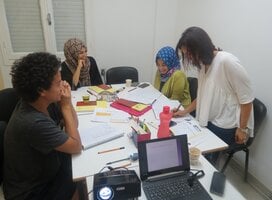Arabic Language Schools in Tunisia
Professionals, students, and travelers come from all over the world to study Arabic in Tunisia. Some come for one week, some for a year. Some study at language schools or with private tutors, others at universities. No matter which program you end up choosing, take time to get to know what makes Tunisia unique. It's one of the few places in the world that has ties to Europe, Africa, and the Middle East.
Learning Arabic as a beginner will not necessarily be easy. You're not only learning to speak a new language, but you're also learning to write and read a whole new alphabet as well. The language -- even basic greetings -- can be complex, but this brings a sense of satisfaction when you get it right. You can reward yourself in your free time with visits to museums and markets. Or you can join locals at coffee shops and enjoy the Mediterranean climate at Tunisia's famous beaches.
Course Types
There are courses for every type of student. If you are newer to international travel and have little to no experience with Arabic, studying abroad with a third party provider is the easiest option. All details of the experience are arranged for you, and you usually pay a flat rate for flights, tuition, accommodations, excursions, and some meals. You can find more information about this course type in the Go Overseas guide to studying abroad in Tunisia.
Similar to this course type is volunteering or interning abroad. You might come across organizations offering placement in Tunisia where you can volunteer or work with a local business and take Arabic language courses as part of the cost of the program. These will be few and far between, and the focus of these course types will likely be on the job or volunteer experience rather than Arabic language class.
On the opposite end of the spectrum are Arabic language schools. These programs offer a variety of program types to fit the needs of the student. This means you'll find courses that last one week or longer, ranging from independent tutoring to classes with 30 students or more, and with various amounts of time spent in a classroom each day.
Why Learn Arabic Abroad?
You'll hear over and over that the best way to learn a new language is to fully immerse yourself in the language and its culture by studying abroad. Of course, this is true for Arabic as well. However, when learning Arabic there are a couple of reasons that make it especially meaningful to study the language abroad.
One reason to study Arabic abroad is to understand the various dialects. Learning Arabic in Tunisia will give you a better grasp of those dialects right from the start. In addition to understanding the dialects, you'll also gain a greater appreciation for Arab culture, a culture that is often misrepresented in other areas of the world.
Qualifications
Generally speaking, if you are taking a beginner's course, the only qualifications you'll need to study Arabic in Tunisia are a willingness to learn and travel. For anything past an introductory program, you will most likely need to complete an interview with the instructors in Arabic to be placed in the correct level.
Having some basic knowledge of French might be useful as it is commonly spoken in Tunisia, but it's not required. Other considerations for certain programs include age (many programs have a minimum age requirement of 18), visa type, and education level.
Popular Locations to Learn Arabic in Tunisia
Tunis and Sfax have the highest populations in Tunisia, and will, therefore, have the most options for studying Arabic at language schools or universities. However, some of these schools will be located right outside of the city, offering a quieter living area within easy reach of the city via public transport.
Choosing an Arabic Learning Program in Tunisia
The two main decisions you will need to make are: which course type best fits your needs and where you want to live during that course. If you've only got one week to spend in Tunisia, then you'll be able to find plenty of one-week classes in Tunis. If you want to stay for a full semester, and you are already a college student, you can look into studying abroad with a third party provider. And there are plenty of options between these two extremes.
When you start browsing program options, make note of the location, duration, cost, accommodation options, and any other factors that matter to you. Mark the programs that stand out to you for whatever reason until you've got it narrowed down to three or four options. Then you can start contacting the organizations with additional questions if necessary. After this, there will most likely be one program that's the clear winner.
Cultural Immersion in Tunisia
Anytime you travel to a new country there will always be a cultural adjustment period. You might notice a difference in how Tunisians interact with each other in terms of personal space. Tunisians are known for being hospitable in their homes, but you might have to fight your way to the front of the line when you're out and about.
English is not spoken by everyone, but you'll be able to get by in tourist areas. If you speak French, you'll be able to communicate easily in Tunisia. Attempt to speak Arabic and you will be met with pleasantly-surprised locals.
Familiarize yourself with the basics of Islam before you go. It will help you see it for what it is and not how it is often portrayed by the media.
Average Arabic Language School Tuition in Tunisia
The least expensive option for studying Arabic in Tunisia is to take classes at a language school. There are some schools that offer intensive classes for $200 per month in Tunis. The mid-range option is private instruction with a tutor, which can cost $200 per week.
Studying abroad at a university in Tunisia can cost approximately $17,000 per semester. This price usually includes tuition, flights, accommodation, and excursions. Scholarships are also easier to find if you'll be taking college-level classes.
Scholarships for Learning Arabic in Tunisia
When searching and applying for scholarships to fund your time in Tunisia, keep in mind that Tunisia is not a top destination for study abroad and Arabic is not a commonly studied language by U.S. citizens. This puts you at an advantage.
For example, there are full scholarships available from The Critical Language Scholarship Program to those who want to study Arabic abroad.
Cost of Living in Tunisia
Compared to popular destinations for studying abroad, living in Tunisia is very inexpensive. On the lowest end of that scale, you can find student housing in Tunis for as little as $100 per month. The cost of food is not included in this amount. A homestay will cost around $200, and some meals will be included.
If you are going through an organization that helps arrange your housing and meals, it might cost a little more. Plan on at least $70 per week for a single room in a hostel with breakfast included or $250 per week for a room with a host family with all meals included.
If you know someone in Tunisia and can stay for free, you'll only need to worry about meals, travel costs, excursions, and souvenirs. Outside of the cost of airplane tickets, all of these expenses will be minimal compared to the cost of living in the U.S.
Visa & Other Relevant Information
U.S. Citizens do not need a visa if the visit will be for under 90 days. Make sure your passport does not expire for at least six months after you plan to return to the U.S.







